A bar of soap that’s been made in small batches by hand, often by a single soap maker, is an affordable luxury that anyone can enjoy.
I refer to luxury soap as designer soap, artisan soap, or simply as handmade soap, but what I didn’t realize is that the commercially-available “soap” in stores isn’t always real soap!
So, what is a luxury soap, and why is it better than a cheap bar of the store brand?
As a general rule, luxury soap is handmade in small batches by an artisan who uses natural ingredients to create a quality product. Luxury soap is generally better for the skin than commercial brands due to the lack of unnecessary chemicals and detergents, which can be drying. The process of making handmade soap creates a product that contains natural humectants which can be more hydrating than store-bought soap.
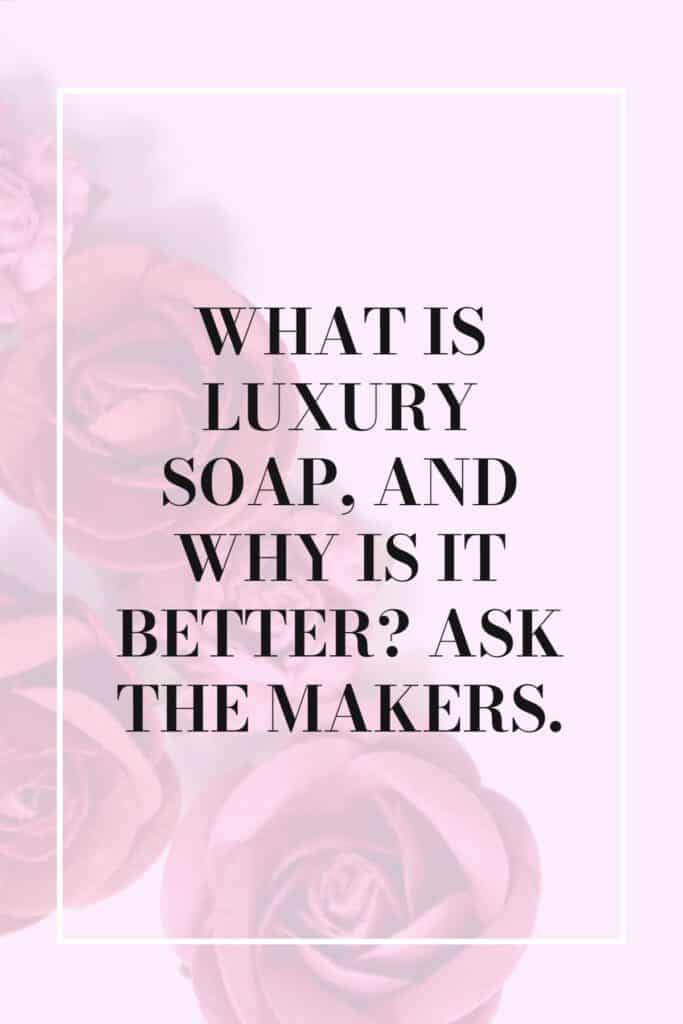
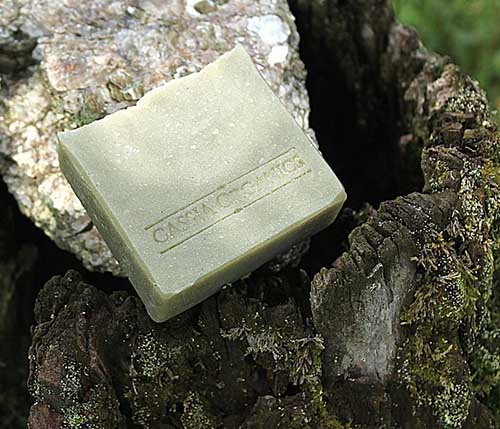
What is soap made of?
Handmade soap is made when oil, water, and lye are combined and create a chemical reaction that results in saponification, which transforms the liquids to a solid. When combined in the correct proportions, there will be no lye left over when saponification is completed.
The types of oils that are used in the mixture can determine the qualities of the soap as far as lathering and moisturizing go, and the soap can be customized with fragrances and other natural ingredients.
Handmade soap can include additional ingredients such as essential oils, texturizers like ground-up oats, coffee, or sugar, and natural colorants that are skin safe.
Depending on the process that’s used to make the soap, some plants and flowers can also be used to “decorate” the soap.
What I didn’t realize when I started investigating this topic is that a lot of the bar soaps that are sold in stores don’t even qualify as real soap under the FDA definition. If you want to read the whole FDA article click here .
.
The short version is that “soap” is defined as the product created when oil, water and an alkaline are mixed, and that to be considered real soap the cleaning action has to come only from those ingredients.
If it’s real soap, it’s regulated by the Consumer Product Safety Commission, not the FDA.
If there are additional detergents or hardeners added to the mix, which is pretty common with commercial soap, it can still be labeled “soap,” but the FDA considers it to be a cosmetic.
The FDA also states that if there’s any other claim about moisturizing, deodorizing, or treating an illness, it’s not soap anymore, it’s considered a cosmetic or a drug.
That requires different regulations and labeling, and it will be regulated by the FDA, not the CPSC.
The main difference between handmade and commercial soap, though, is that most commercial soap contains detergents, which are manmade and not natural.
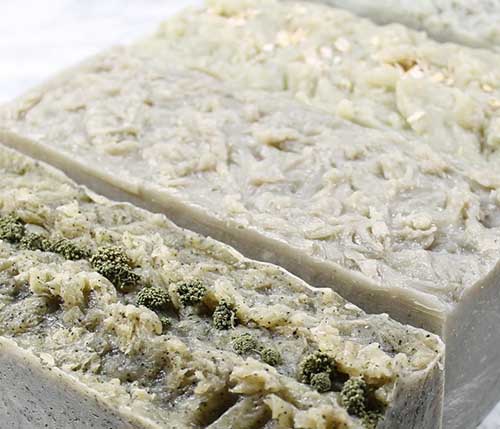
Detergent vs Soap: What’s the difference?
Soap is made from the reaction of oil, water, and lye, and contains glycerin as a natural byproduct of the chemical reaction resulting from saponification. Soap works best in warm or hot water and needs to have a clean water rinse to remove it after use. Detergents are manmade soap substitutes that can be used in hot or cold water and don’t leave a residue. They are more drying and can strip natural oils from the skin.
A lot of mass-market soap is made with detergent because of the convenience of using manmade ingredients instead of going through the process of making real soap, which is time-consuming.
As Jes Ware of Sixth Spice explains, ” The majority of commercial soap companies use these ingredients because they are cheap to manufacture, and then they can sell you their lotions to repair the skin they just stripped of moisture.” Pretty tricky!
explains, ” The majority of commercial soap companies use these ingredients because they are cheap to manufacture, and then they can sell you their lotions to repair the skin they just stripped of moisture.” Pretty tricky!
One of the benefits of luxury soap would obviously be that if it’s real handmade soap, it’s going to be less drying than a commercial bar that may or may not include detergents.
The problem is that a lot of “luxury” soap that’s sold in the mass market and labeled as handmade can still include other ingredients, as I mentioned above when the FDA rules were listed.
Because of this, you should be careful to read the ingredients on a soap label to make sure that it doesn’t contain drying chemicals.
Jes adds that the ingredients in handmade soap are usually better than the ones in commercial soaps, but that “This will vary from soap maker to soap maker depending on the values of the maker and the ingredients they choose to use.
A good rule of thumb is to avoid SLS sodium lauryl sulfate, SLES sodium lauryl sulfate, and even sodium coco sulfate. Even though sodium coco sulfate is naturally derived from coconut, it still contains 50% to 70% SLS, depending on the manufacturer.”
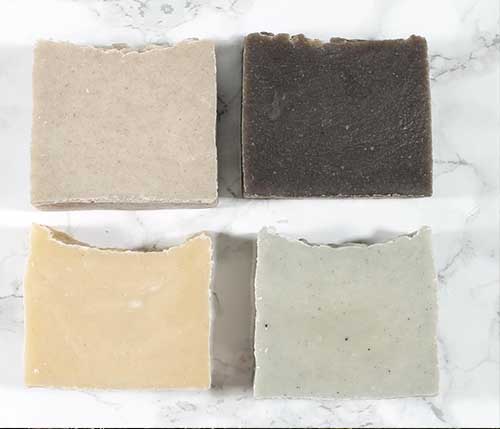
Birgit Tolman of Cassia Organics says that “Handmade soap retains all of the moisturizing glycerin (removed in commercial soap and sold for other purposes) with creamy bubbly lather. Commercial soaps have to add synthetic ingredients to achieve the same.
“Handmade soap is milder and gentler on the skin as it contains no surfactants, foam boosters, detergents or lathering agents.”
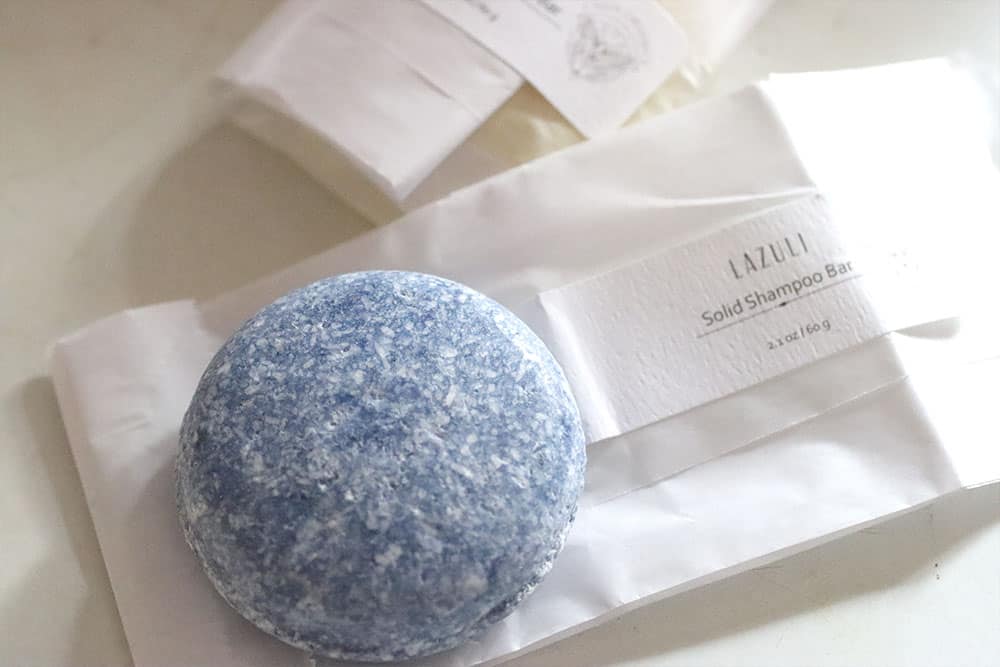
Is handmade soap more eco-friendly than commercial soap?
In addition, there’s an environmental impact that you might not even be considering when you buy soap. I hadn’t thought about this, but Birgit points out that “Commercial soaps have a larger impact on the environment, from the container to the ingredients of the soaps.
“Many handmade soap makers choose to make soap without palm oil or only use sustainably harvested palm oil, which is better for the environment.”
So not only is handmade luxury soap better for your skin, it’s also better for the environment, depending on the types of oils that the soap maker chooses to use.
Buying a luxury soap that is actually real soap, and not detergent disguised as soap, will benefit your skin and the environment as well.
And it could actually save money and time in the long run if you don’t have to use lotion to replace the oils that detergent-based soaps strip from your skin!
To see the list of Luxury Handmade Soap Makers in the Artisan Shopping Directory, click here: Bath and Body

